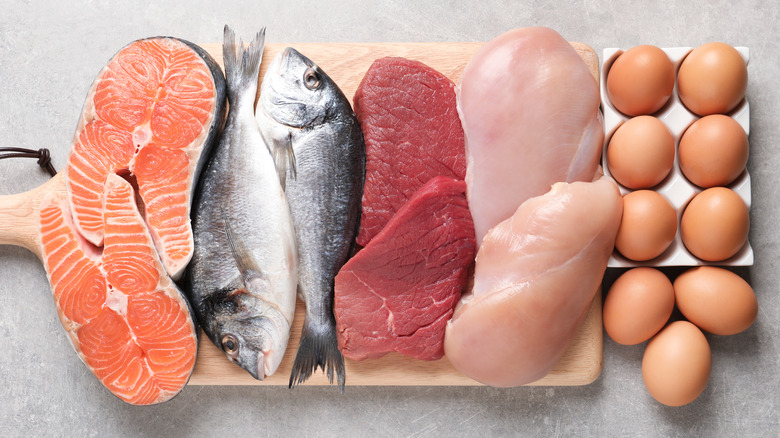How Too Much Protein Impacts Your Bladder
High-protein diets advocate getting between 30% and 50% of your daily calories from protein-rich foods. Because protein will make you feel full, you tend to eat less on these diets. Many high-protein diets also cut carbohydrates so that your body uses fat, rather than carbs for fuel (via HealthySD.gov). What's more, you're likely to see a bigger change on the scale, since high-protein diets cause your body to shed excess water (via Livestrong). This rapid weight loss might keep you motivated to stay on the diet, but it's not healthy for your urinary system in the long term.
According to Cleveland Clinic, too much protein drives up the acid and toxins in your body. Your kidneys respond by filtering this excess and removing it from your body. As a result, the urine produced is much more acidic for the bladder (via Livestrong). A 2016 study in the Journal of Translational Medicine found that this highly concentrated, acidic urine caused bladder problems and cancer in laboratory rats.
Staying healthy on a high-protein diet
According to Mayo Clinic, you can follow a high-protein diet for the short term if you don't have any contraindicated health conditions. If you have kidney disease, eating too much protein can aggravate the illness. Any diet recommending protein high in saturated fat might spike your cholesterol. Instead, choose lean meats, fish, and low-fat dairy. You'll want to stop eating processed meats such as sausage, hot dogs, and deli meats.
Although many high-protein diets drastically reduce carbohydrates, you'll need to choose healthy vegetables, fruit, and whole grains to keep your kidneys operating well, according to the National Institute of Diabetes and Digestive and Kidney Diseases. To keep your bladder healthy, be sure to drink enough fluids (preferably water) so that you need to use the bathroom every three or four hours. Cutting back on alcohol and caffeine also keeps the body adequately hydrated and helps avoid bladder problems (via National Institute on Aging).

